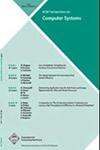Comprehensive formal verification of an OS microkernel
IF 1.8
4区 计算机科学
Q2 COMPUTER SCIENCE, THEORY & METHODS
引用次数: 347
Abstract
We present an in-depth coverage of the comprehensive machine-checked formal verification of seL4, a general-purpose operating system microkernel. We discuss the kernel design we used to make its verification tractable. We then describe the functional correctness proof of the kernel's C implementation and we cover further steps that transform this result into a comprehensive formal verification of the kernel: a formally verified IPC fastpath, a proof that the binary code of the kernel correctly implements the C semantics, a proof of correct access-control enforcement, a proof of information-flow noninterference, a sound worst-case execution time analysis of the binary, and an automatic initialiser for user-level systems that connects kernel-level access-control enforcement with reasoning about system behaviour. We summarise these results and show how they integrate to form a coherent overall analysis, backed by machine-checked, end-to-end theorems. The seL4 microkernel is currently not just the only general-purpose operating system kernel that is fully formally verified to this degree. It is also the only example of formal proof of this scale that is kept current as the requirements, design and implementation of the system evolve over almost a decade. We report on our experience in maintaining this evolving formally verified code base.一个操作系统微内核的全面的正式验证
我们对seL4(一种通用的操作系统微内核)的全面的机器检查形式验证进行了深入的介绍。我们讨论了我们用来使其验证易于处理的内核设计。然后,我们描述了内核C实现的功能正确性证明,并介绍了将此结果转化为内核的全面形式化验证的进一步步骤:一个正式验证的IPC快速路径,一个证明内核的二进制代码正确实现C语义的证明,一个正确的访问控制强制执行的证明,一个信息流不干扰的证明,一个健全的二进制最坏情况执行时间分析,以及一个用户级系统的自动初始化程序,它将内核级访问控制强制执行与系统行为推理联系起来。我们总结了这些结果,并展示了它们如何整合成一个连贯的整体分析,由机器检查的端到端定理支持。seL4微内核不仅是目前唯一一个经过正式验证的通用操作系统内核。这也是唯一一个正式证明这一规模的例子,它在近十年来随着系统的需求、设计和实现的发展而保持最新。我们报告我们在维护这个不断发展的经过正式验证的代码库方面的经验。
本文章由计算机程序翻译,如有差异,请以英文原文为准。
求助全文
约1分钟内获得全文
求助全文
来源期刊

ACM Transactions on Computer Systems
工程技术-计算机:理论方法
CiteScore
4.00
自引率
0.00%
发文量
7
审稿时长
1 months
期刊介绍:
ACM Transactions on Computer Systems (TOCS) presents research and development results on the design, implementation, analysis, evaluation, and use of computer systems and systems software. The term "computer systems" is interpreted broadly and includes operating systems, systems architecture and hardware, distributed systems, optimizing compilers, and the interaction between systems and computer networks. Articles appearing in TOCS will tend either to present new techniques and concepts, or to report on experiences and experiments with actual systems. Insights useful to system designers, builders, and users will be emphasized.
TOCS publishes research and technical papers, both short and long. It includes technical correspondence to permit commentary on technical topics and on previously published papers.
 求助内容:
求助内容: 应助结果提醒方式:
应助结果提醒方式:


